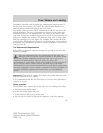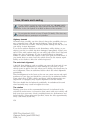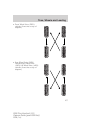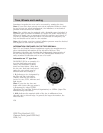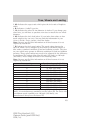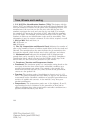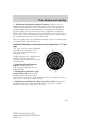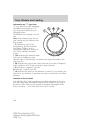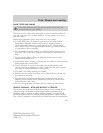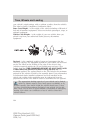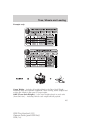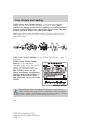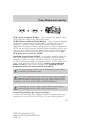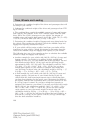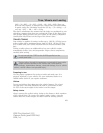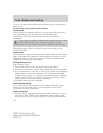
SNOW TIRES AND CHAINS
Snow tires must be the same size and grade as the tires you
currently have on your vehicle.
The tires on your vehicle have all weather treads to provide traction in
rain and snow. However, in some climates, you may need to use snow
tires and chains.
Follow these guidelines when using snow tires and chains:
• Use only SAE class “S” cables or equivalent on the front axle for
P215/60R17 equipped vehicles. SAE class “S” chains or other
conventional link chains may cause damage to the vehicles wheel
house and/or body. Use of optional spike spider type traction devices
or equivalent is also acceptable.
• Do not install tire chains, cables, or optional traction devices on the
rear tires. This could cause damage to the vehicle’s wheel house or
body.
• Do not use tire chains, cables, or optional traction devices with
optional P225/55R18 tires.
• Install cable chains securely, verifying that the cables do not touch any
wiring, brake lines or fuel lines.
• Drive cautiously. If you hear the cables rub or bang against your
vehicle, stop and re-tighten the cables. If this does not work, remove
the cables to prevent damage to your vehicle.
• If possible, avoid fully loading your vehicle.
• Remove the tire cables when they are no longer needed. Do not use
tire cables on dry roads.
• The suspension insulation and bumpers will help prevent vehicle
damage. Do not remove these components from your vehicle when
using snow tires and chains.
• Do not exceed 30 mph (48 km/h) with tire cables on your vehicle.
VEHICLE LOADING – WITH AND WITHOUT A TRAILER
This section will guide you in the proper loading of your vehicle and/or
trailer, to keep your loaded vehicle weight within its design rating
capability, with or without a trailer. Properly loading your vehicle will
provide maximum return of vehicle design performance. Before loading
your vehicle, familiarize yourself with the following terms for determining
2006 Five Hundred (500)
Owners Guide (post-2002-fmt)
USA (fus)
Tires, Wheels and Loading
163



